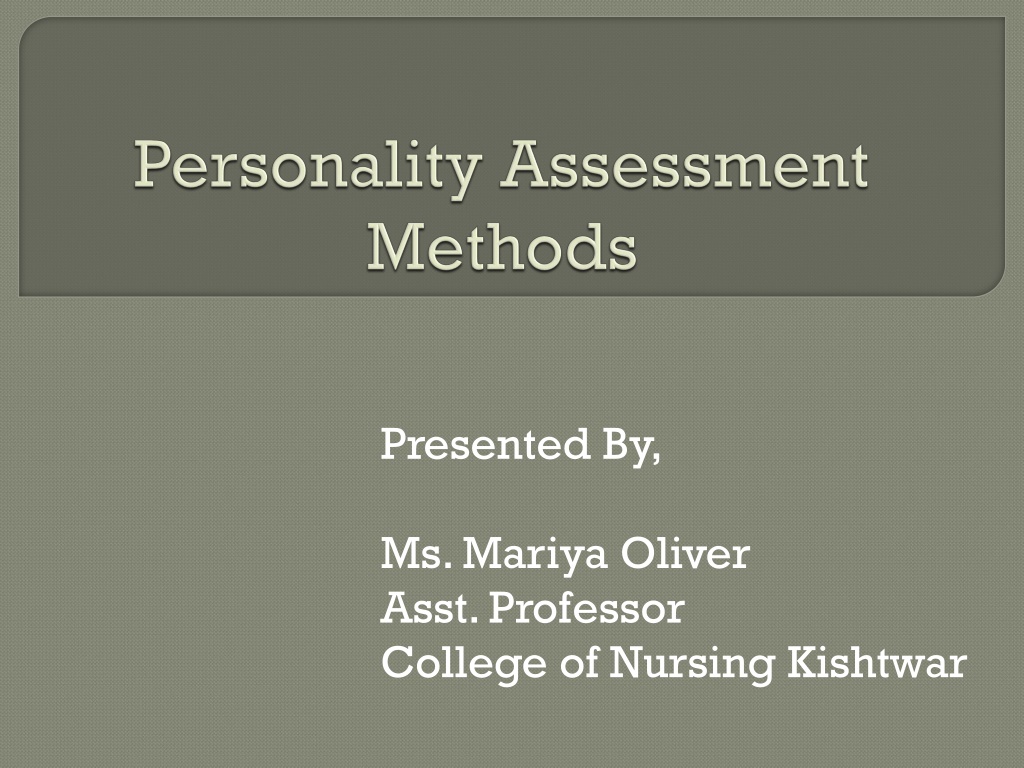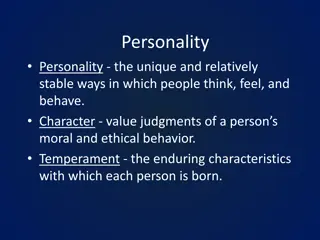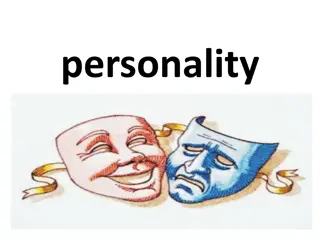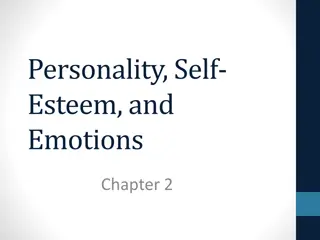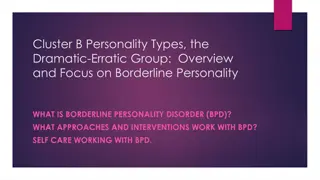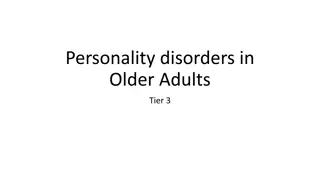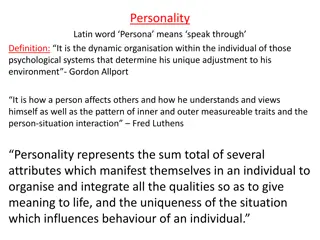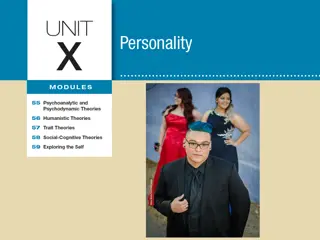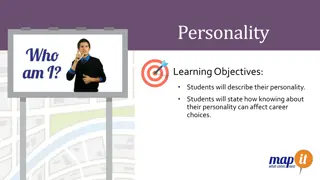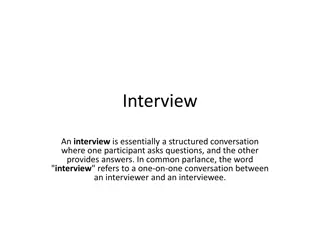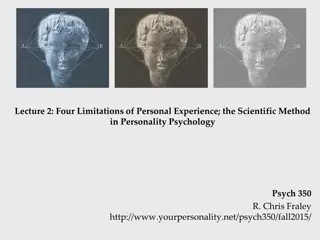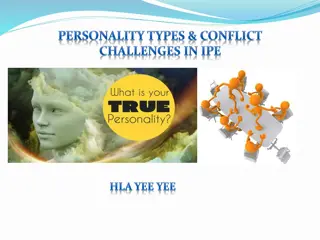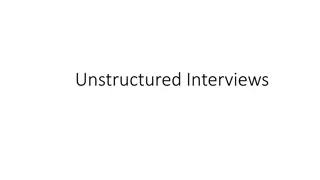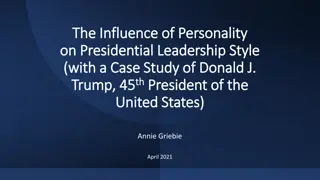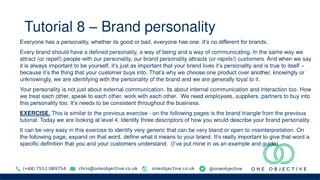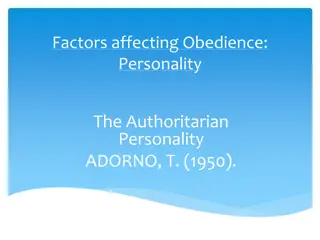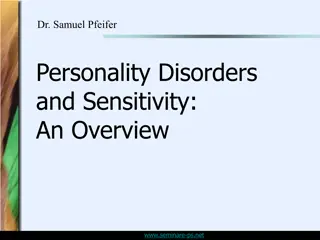Understanding Personality Assessments in Interviews
Personality assessments in interviews are valuable tools for evaluating a candidate's characteristics, abilities, and aspirations. Various types of assessments, such as structured and unstructured interviews, personality inventories like the Minnesota Multiphasic Personality Inventory, the Big Five Inventory, the Eysenck Personality Inventory, and the Cattell's 16 Personality Inventory, provide insights into an individual's traits and behaviors. These assessments offer advantages like flexibility in evaluation but also come with challenges due to subjectivity and time consumption.
Uploaded on Jul 29, 2024 | 1 Views
Download Presentation

Please find below an Image/Link to download the presentation.
The content on the website is provided AS IS for your information and personal use only. It may not be sold, licensed, or shared on other websites without obtaining consent from the author. Download presentation by click this link. If you encounter any issues during the download, it is possible that the publisher has removed the file from their server.
E N D
Presentation Transcript
Presented By, Ms. Mariya Oliver Asst. Professor College of Nursing Kishtwar
Interview is defined as a face to face conversation carried on with some basic goals. Two types: Structureed Interview Unstructured Interview
Seven Point Plan. Physical characteristic or abilities. Attainments Education, personal and professional background. Overall general ability Special aptitude. Interests. Personality attributes. Aspirations and goals.
Advantages It is highly flexible tool. It can be used for a wide range of people. Body language can be observed in addition to what is said. Disadvantages Highly subjective. Time consuming Requires trained personnel.
A personality inventory is a printed form containing statements, questions or adjectives which apply to human behaviour.
Minnesota Multipahsic Personality Inventory. This test asks for answers of True or False or Cannot say to 550 statements about different personality traits such as attitudes, emotional reactions, physical and psychological symptoms. The answers are quantitatively measured and personality assessment is done based on the score.
Eysenck Personality Inventory The dimensions of this inventory are as follows: Extroversion Introversion. Neuroticism Stability The test may take 15 20 minutes and consists of 57 yes or no questions. There is no right or wrong answer, the subject has to give an honest opinion.
Cattells 16 factory Personality Inventory. Abstractedness: Imaginative versus practical Apprehensions: Worried versus confident Dominance: Forceful versus submissive Emotional Stability: Clam versus high strung Liveliness: Spontaneous versus restrained. Openness to Change: Flexible versus attached to the familiar. Perfectionism: Controlled versus undisciplined. Privateness: Discreet versus open
Cattells 16 factory Personality Inventory. Reasoning: Abstract versus concrete Rule Consciousness: Conforming versus non conforming Self Reliance: Self sufficient versus dependent Sensitivity: Tender hearted versus tough minded Social Boldness: Uninhibited versus shy Tension: Impatient versus relaxed. Vigilance: Suspicious versus trusting Warmth: Outgoing versus reserved
Rorschach Inkblot Test It is developed by Herman Rorschach in 1921. This test involves ten cards containing inkblots show to the subject one at a time in a prescribed order five black and white, two red or grey and three colour cards. Unveil hidden thought process The subject is instructed to state whatever he/she sees in them or whatever they bring to mind. Based on subject s statement, assumptions are made on the nature of personality.
Thematic Appreception Test Developed by C.D.Morgan and Henry A Murray in 1935 The assumption underlying the Thematic Appreception Test is that the meaning which we see in a picture reveals something of our past experience, feelings, attitudes and motives. In this test, the subject is shown ambiguous pictures and asked to make up a story for each one. There are 30 gray scale pictures and one blank for elicitation of stories.
Word Association Test In word association test, the subject is informed that the examiner would utter a series of words, one word at a time and subject should immediately utter the first word that comes to his mind. There are no right or wrong answers. Based on the subject s response the examiner evaluates the individual s personality.
Sentence Completion Test Here a number of incomplete sentences are given and the subject is required to complete them as to how he/she feels. The responses are analyzed for indications of one s personality. The test includes the information about wishes, desires, likes, dislikes, fears and locus of control..
Situational Test This consists of certain real life situations where the subjects have to perform certain given activities. Subject s performance and behaviour with respect to such situations helps us to understand his/her personality. In this test, the subject s behaviour is evaluated by some trained person.
Advantages Helps assess personality. Helps in career choices. Helps in recruitment process. Disadvantages It varies from person to person. Subject can fake at being good or bad There are chances of random responding.
